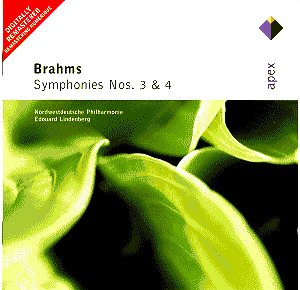I
have recently commented
on this conductorís coupling of Beethoven 5 and 7, and gave there
a short outline of his career, which appears to have been of a
higher profile than our scant knowledge of him in England suggests.
I enjoyed the Beethoven disc for its spontaneity and sense of
enjoyment.
In
Brahms it seems that Lindenberg is best suited to the middle movements.
That of no. 3 gets a refreshingly swift reading; no sense of haste
but warmly flowing and without the lugubriousness which sometimes
sets in as Brahms has his tiny melodic phrase of two repeated
notes echoed around the orchestra in a proto-Webern manner. Though
Boult was noted for not letting slow movements drag, Lindenbergís
7í 56" is even more forward-moving than the English conductorís
8í 32".
However,
it seems that swift slow movements were not a matter of principle
with Lindenberg since that of no. 4 takes 11í 33" compared
with Boultís 9í 56" (and close to Mengelbergís 11í 40").
It is a grave reading, beautifully phrased and sufficiently fluid
to avoid heaviness.
In
the third movement of no. 3 Lindenberg captures ideally the gentle
grace of Brahmsís intermezzo, while the fierce attack of the corresponding
movement in no. 4 quite took me by surprise. The more delicate
episodes are also well expressed so this is another outstanding
reading.
The
spontaneity of the performance means that a number of points of
balance, phrasing and articulation which are very slightly smudged
in the exposition to the first movement of no. 3 (no repeat) come
right in the recapitulation. Was there not enough rehearsal time
to record the exposition again? At the outset I was not sure whether
this was a version to consider seriously or not, but by the end
of the movement my feelings were more positive. The finale is
on the slow side and the opening has not the hushed expectancy
of some other recordings. Thereafter it is strongly delivered
with a particularly effective handling of the final winding-down.
The
first movement of no. 4 is not quite concentrated in tempo, moving
forward a little in the more energetic sections. I donít want
to over-emphasize this, but if it emerges more single-mindedly
under Boult, this is the reason. Similarly the finale is done
well but without Boultís sense of seamless line. The final "Più
allegro", for instance, sounds like a sudden spurt of tempo
whereas with Boult it seems to emerge from what has gone before.
The
recordings are good enough but without the dynamic range or the
body of the best late-sixties recordings.
What
does this all amount to? If you want to get these two symphonies
without paying too much you will do no harm to either yourself
or Brahms by acquiring this disc; indeed, you could pay a lot
more and be much worse off. I suppose the existence of the Klemperer
cycle prevented these recordings from making much impact in their
day, yet that great conductorís magisterial authority brings some
strange eccentricities in its train in no. 4 and I donít think
I could prefer it to this. In another famous sixties cycle Bruno
Walter, fine in no. 3, hung fire in no. 4 and the recording was
poor. Boultís 1970s recordings are on a strange label which can
only be bought in HMV shops (and his Brahms should really be judged
on his 1950s cycle, which remains unavailable). Since his performances
of these two symphonies are coupled together (with the repeat
in no. 3 making a very generous 76í 27"), if you have access
to them this is probably the best bargain solution.
If
on the other hand you like to have multiple versions of the principal
masterpieces you will find points of interest here, especially
if all your recordings of no. 3 make heavy weather of the slow
movement. If you want to investigate the art of a possibly underrated
conductor, perhaps the Beethoven record is the best place to start,
but his performances leave a warm feeling after them, whatever
the defects, and I hope there are more to come (this label has
also brought out a coupling of the other two Brahms symphonies).
Christopher
Howell
